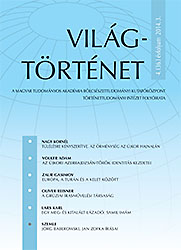Tiflisz. Az etnikai politika olvasztótégelye, 1860–1905
Tiflis: Crucible of Ethnic Politics, 1860–1905
Author(s): Ronald Grigor SunySubject(s): Ethnohistory, 19th Century
Published by: Magyar Tudományos Akadémia Bölcsészettudományi Kutatóközpont Történettudományi Intézet
Keywords: Georgians; Tiflis; Armenians; Ethnic rivalry
Summary/Abstract: To Georgians the „mother of cities” (dedakalaki) has always beer their traditional political center, Tiflis. For most of its modern history, Tiflis has been a cosmopolitan town of mixed nationality, with the dominant demographic position held by Armenians. According to the census of 1897, the city of Tiflis had a population of 159,590. The major demographic trend in Tiflis in the nineteenth century was the steady decline of the Armenian proportion of the population and the rise of the Georgian and Russian components. By the latter half of the nineteenth century the Armenians no longer had a majority in the city, merely a plurality, and the percentages of each nationality in the urban population were moving toward equality. The percentage of Armenians dropped from 74 to 38. Besides being an important trading center, Tiflis was also the most important „industrial” city in the Caucasus in the period before the oil boom of the 1880s raised the Caspian port of Baku to predominance. By the end of the nineteenth century, the position of Armenian merchants and industrialists in the economy of Tiflis and western Transcaucasia was unassailable. Ethnic rivalry did not erupt into political conflict until the last decade of the century. The growing concern with the future of Georgians and Armenians in a russifying, modernizing autocratic Empire found its way into the politics of the Tiflis city council. Five years into the twentieth century Tiflis was a city in turmoil, riven by the rivalries and conflicting interests of Armenians and Georgians, the Russian state and Caucasian society, workers and the propertied middle class. The restoration of order by the tsarist administration, accomplished only at the cost of lives and recently won liberties, lasted precariously for more than a decade.
Journal: Világtörténet
- Issue Year: 2014
- Issue No: 3
- Page Range: 433-454
- Page Count: 22
- Language: Hungarian

